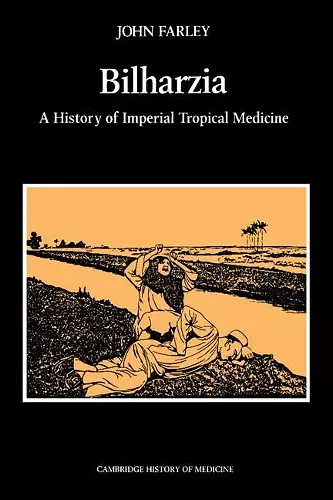Bilharzia
A History of Imperial Tropical Medicine
Format:Paperback
Publisher:Cambridge University Press
Published:11th Dec '03
Currently unavailable, and unfortunately no date known when it will be back
This paperback is available in another edition too:
- Hardback£105.00(9780521400862)

Professor Farley describes how governments and organizations faced one particular tropical disease, bilharzia or schistosomiasis.
The advent of tropical medicine was a direct consequence of European and American imperialism, when military personnel, colonial administrators, businessmen, and settlers encountered a new set of diseases endemic to the tropics. Professor Farley describes how governments and organizations in Britain, the British colonies, the United States, Central and South America, South Africa, China, and the World Health Organization faced one particular tropical disease, bilharzia or schistosomiasis. Bilharzia is caused by a species of blood vessel-inhabiting parasitic worms and today afflicts over 200 million people in seventy-four countries. John Farley demonstrates that British and American imperial policies and attitudes largely determined the nature of tropical medicine. Western medical practitioners defined the type of medical system that was imposed on the indigenous populations; they dictated which diseases were important and worthy of study, which diseases were to be controlled, and which control methods were to be used.
"...ought to be read, not just by historians and doctors as the blurb suggests, but also by those concerned with the future of populations and the planet." Anne Hardy, Times Higher Education Supplement
"This fascinating work combines the history of scientific investigations of a major human worm parasite and the story of largely ineffectual efforts by Anglo-American imperial powers to eradicate the resulting disease....detailed and lively account...." Choice
"Farley's fine book demonstrates that few areas of medical history are more relevant to present problems than is tropical medicine. This book deserves a wide readership among those interested in medical history, the history of tropical medicine and parasitology, and health care in the Third World." K. David Patterson, BHM
"This very interesting book traces the history of the discovery of the disease; the best methods of control and prevention; and the extent to which financial support for research depended on different governments imperial role and ambitions. There are also interesting side lights on the interactions of the different research workers which indicate that human nature does not change." Gen. Pharmac.
Farley has marshaled impressive amounts of data, and from them he has constructed a fascinating account....illustrates admirably the historiographic value of its approach...." Molly Sutphen, Isis
"...well written, well organized, and generally accurate. I recommend it to those interested in the history of medicine in the tropics." Allen Cheever, Current Surgery
"...an impressive example of interdisciplinary research. It will be welcomed by medical historians, as well as by those interested in the history of imperialism and international development." Randall Packard, Journal of Interdisciplinary History
"Clearly written, Farley's book covers a broad canvas, including the American South, Central America, the Philippines, Rhodesia, South Africa, and China. Avoiding technical language that might drive the non-specialist away, he has taken care to obey the popular implications of his own argument. To make his imperialist critique, he has chosen an eminently suitable topic that never ceases to be interesting and illuminating." Diana Wylie, International Journal of African Historical Studies
"Medical historians, especially those with an interest in tropical medicine, will find this text of enormous interest..." G.C. Cook, Journal of Infection
"...compelling..." The Lancet
ISBN: 9780521530606
Dimensions: 229mm x 156mm x 23mm
Weight: 550g
372 pages